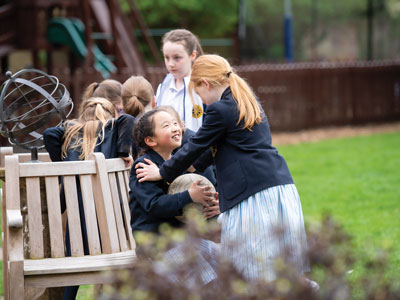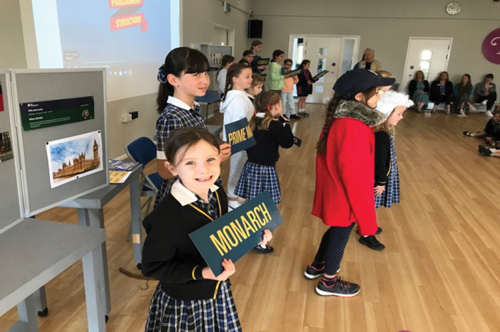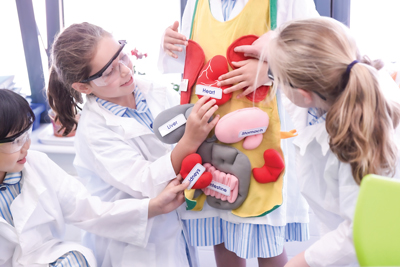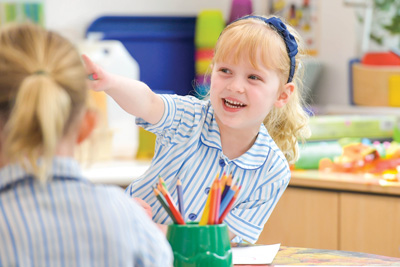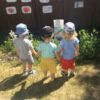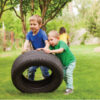by Naomi Bartholomew
Headmistress, St Catherine’s Prep School, Bramley, Surrey
Life at Prep School is full of firsts. The first time we do anything requires courage and determination which is why I so admire young children and so enjoy watching their early journey through school.
Before joining school, children will have already had many milestone moments – moving from cot to bed, their first steps, their first tooth and many more. The first day of school arrives all too quickly and from there a series of challenges and wonderful opportunities await.
Ahead of starting school encourage your child to engage in creative play. Allow them to solve some of their own problems – when they put their shoes on the wrong feet, pause and see if they can figure that out for themselves. Provide simple choices but limit them to two or three options – I often refer to this as the ‘carrot or peas’ approach. Rather than, “What would you like to eat?” which is a crazy question to ask a pre-school child, offer two alternatives. Give your child opportunities for play games which involve taking turns and sharing as well as dressing up and role-play. Encourage the use of full sentences when talking to your child. Avoid comments like, “Mummy wants you to come over and help” and start to use, “Please can you come and help me” and “Thank you”.
The first day of school is a major event but don’t overplay this. You will have spent considerable time and effort choosing the right school, trust your instincts and remain calm and positive. Allow plenty of time for the school run on the first morning and leave as quickly as you can once your child is in the classroom and starting to settle. Your child will spend the day learning names of the other children in the class, being shown their immediate environment and they will most likely come home exhausted but happy.
During the first term, establish a good rapport with your child’s teacher and encourage their early reading and writing at home as advised by the school. Ask what happens in the book that they are reading and help with extending their vocabulary to include words such as ‘first, second, finally.’ Don’t be scared to use the correct vocabulary – if your child can recite Hickory Dickory Dock they can learn the correct vocabulary and should be moving away from pet names for things.
You will hear about the first falling out between friends. If you have watched ‘The Secret Life of Four Year Olds,’ you will see these happen frequently and are as quickly resolved. There will be moments where your child’s effort and success is recognised and other moments when they feel overlooked or left out. They are still in egocentric infant mode and it is important to remember that you are hearing a four year old version of events.
The first nativity with lines to deliver, songs to sing and the chance to ‘perform’ in front of an audience. They are likely to be apprehensive especially post pandemic but also excited to show their newfound confidence. Your child will want to please you, please their teacher and be starting to want to please their peers by this stage. Frantic waving and trying to get their attention from your seat in the audience is adding pressure to an already fairly daunting experience for some. By all means wave on arrival and reassure your child that you are there but try to keep it discrete.
By the end of the first year your child will be very attached to their first teacher and the school will prepare them for moving on to a new class, possibly with new pupils arriving too which can change the dynamic amongst the class. Over the first long summer break encourage more constructive play which requires your child to build things, take things apart and put them back together. Go on walks, build dens in the garden, start to ride a bike. Check table manners and correct use of cutlery and ‘please and thank you’s.’ Use the days of the week more and continue with reading and basic writing.
Then come swimming lessons, possibly picking up an instrument for the first time, presenting in assembly and taking on minor roles of responsibility within the class (taking a message to the office or assisting with classroom chores). You will increasingly feel that you are not there for every milestone moment. This is important as your child will be forming a self-esteem based on their sense of their own achievements and by six we hope finding intrinsic motivation. They will be working out that effort impacts outcomes and they will be turning to peers to share their achievements. Winning the sack race, learning their times tables, holding the door open for a visitor, sharing their snack at break are all equally important.
Each of these little steps are in fact giant leaps. Here at St Catherine’s we aim to capture the magic as it happens and share it with you when we can. We ask the children to give everything a try and to step out of their comfort zone with as much confidence as possible. Learning at this age must be fun and curiosity must be fostered. Enjoy the milestone moments – they are to be cherished.
St Catherine’s is situated in the village of Bramley, four miles south of Guildford, which has fast train connections to London. Prep School girls benefit immeasurably from the world-class facilities of the Senior School, including the extensive grounds, 25m indoor pool, sports hall, dance studio, magnificent auditorium and 19th century chapel. Girls from age four engage in a full and varied curriculum which includes music, IT, ballet and sport delivered by dedicated specialist teachers. Our Patron, HRH The Duchess of Cornwall, said on a recent visit, “You are all extremely lucky to be at such a wonderful school.” www.stcatherines.info
